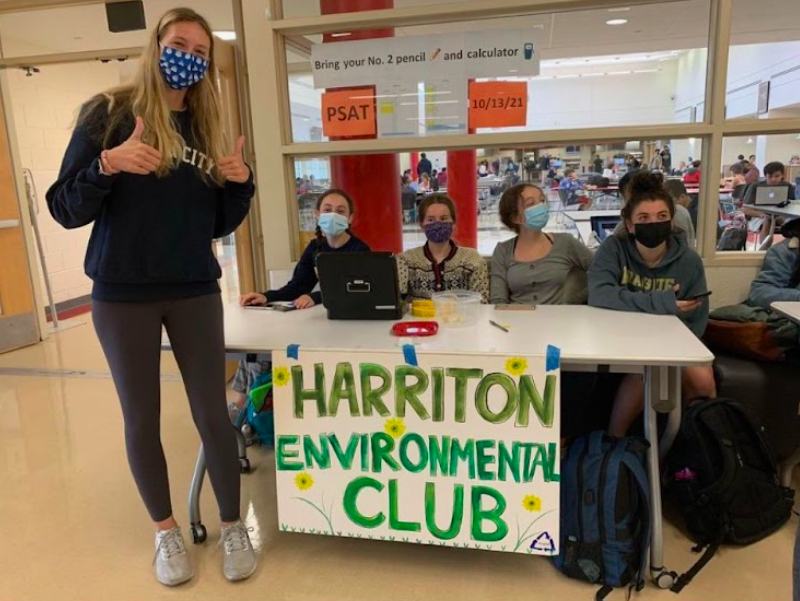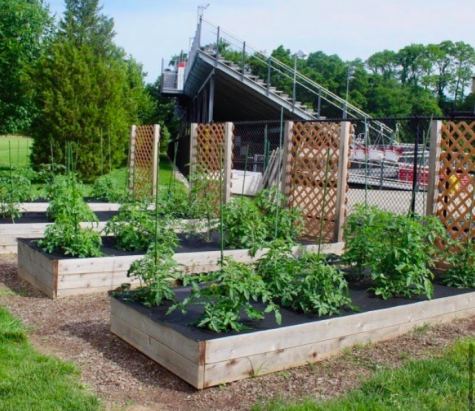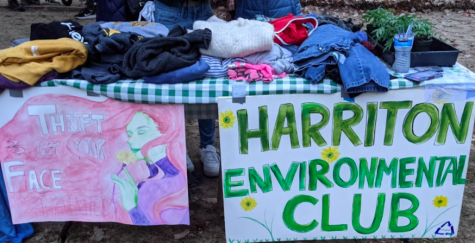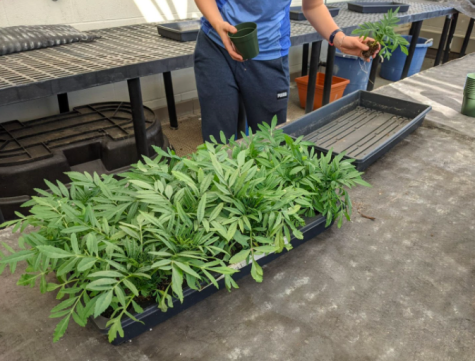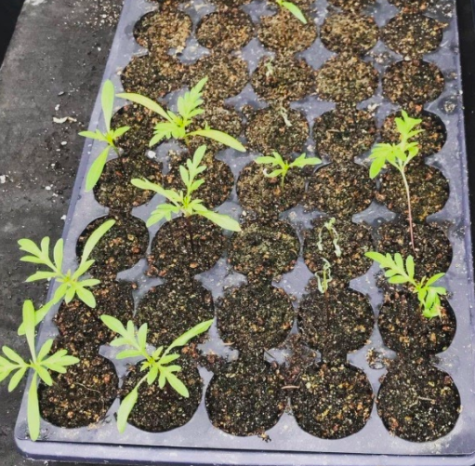Clubs of Harriton: Environmental Club
It is another early morning at Harriton. The sun is just rising over the baseball field, turning the sky pink and lining the clouds with tangential lighting. The hallways are quiet, the first buses just arriving, the library lights flickering on as the clock strikes 7. The early morning sunlight flashes off the windows, and off of…. A greenhouse. A glass greenhouse built into the third story of the school. And before you ask, no, I am not making this up. This is not the pool on the “fourth floor.” Harriton really does have its own greenhouse, and a club which takes care of it. This club is the Environmental Club, an extracurricular which gives Harriton students the opportunity to learn about climate issues and sustainability, as well as the opportunity to share their own voices and passions. I interviewed club sponsor Mr. Ferraro and Environmental Club’s officers: Pauli Voelkel, Julie Wright, Eden Brunner, and Allie Hollin, to learn more about this special part of the Harriton community.
The Harriton Banner: What does the Environmental Club do?
Pauli Voelkel: The Environmental Club raises awareness on certain environmental issues and encourages environmentally friendly living and sustainability…
Julie Wright: …We often focus on local sustainability within the Lower Merion community and have partnered with a variety of groups in the past to focus on the environment in our general area.
Allie Hollin: We hold meetings where we talk about and give presentations on topics related to environmental science and often plant in the greenhouse on the 3rd floor! In the past we have run a composting bin at school and we are beginning to hold larger events like clothing exchanges and fundraisers that will go towards purchasing a tree to plant at Harriton at the end of the year!
Eden Brunner: …It is a place where students come together because of a common passion to protect our environment.
THB: When was the Environmental Club created?
Mr. Ferraro: Approximately 20 years ago.
THB: What led you to the Environmental Club/how did you get involved?
Mr. Ferraro: I grew up across the street from the Wissahickon Park/Creek. Spent all my free time surrounded by the beautiful nature it offered. I’ve been teaching Environmental Science for 25 years.
Julie Wright: I was around 12 years old when I really started to learn about climate change and find my passion for learning about sustainability, so when I saw that Harriton had an environmental club at school on my first Ram Day I knew I had to sign up to get myself more involved in environmental activism…
Eden Brunner: I’ve always been interested in the environment, I think it really solidified in Waterbound in 7th grade where I began integrating environmental research into my day to day life. Therefore, it really was no surprise that I joined the Environmental Club as a freshman.
THB: Why is the Environmental Club important to you?
Mr. Ferraro: The club allows me to meet students that I don’t have in class. It is nice to discuss environmental issues and activities with people that are passionate about it and there isn’t a grade attached.
Pauli Voelkel: I adore nature and it saddens me that human behavior has hurt it significantly. I wanted a chance to appreciate it before it was gone. Our Earth is something we should all be trying to protect no matter who we are or where we come from because our planet is all of our homes. It’s something that should unite us, not divide us.
Eden Brunner: I really love that the Environmental Club is a place that allows me to share all of these environmental concerns that I have, but one of my favourite things is actually this new element we began this year – passion research, where different people are making small presentations about things they are passionate about, environmentally related of course. So the club is not only a place where I get to share my thoughts and opinions about the environment, but so does everyone else!
THB: Why is the Environmental Club important to the Harriton community?
Julie Wright: As more students become interested in environmental activism and see the effects of climate change, I feel that it is important for our school to have a club that supports environmental activism as it is a space for students to both learn and advocate. As climate change becomes more severe and more of a pressing political issue, the need for an environmental club not just at Harriton, but at all schools, grows.
Allie Hollin: It can be extremely overwhelming to get started in thinking about sustainability and our impact on the environment, so I think the Environmental Club provides a welcome space where we can all learn more about the natural world and get involved in making positive, tangible changes within our school community.
Eden Brunner: The main reason why the Environmental Club is so important is that climate change is one of the most pressing threats we have against humanity, so doing these small changes – compost, thrifting, recycling – are all things that we have implemented because they are necessary as part of the Harriton community.
THB: What is special about the Environmental Club?
Pauli Voelkel: Environmental Club is special because it’s about celebrating nature and the joy it gives us in times of uncertainty and fear. Change starts with you and there is no better place to start than in a club that explores the possibilities.
Allie Hollin: We have started some really cool projects over the years (composting the food scraps from the cafeteria kitchen, the aquaponics system, planting marigolds, hopefully planting a tree at the end of the year)….
THB: Do you have any fun stories or memories from your years in the Environmental Club?
Pauli Voelkel: My favorite memory from the Environmental Club this year was planting the marigolds. I know everyone was excited to go to the greenhouse so it was a nice treat. The ambience was very cheerful because there was light streaming in from the windows and music was playing on the radio.
Eden Brunner: I would have to say one of my favorite memories from the Environmental Club was freshman year when I was assigned with the task of running our digital thrift store. I remember that there was a time where the majority of the photos I was taking on my phone were these clothes that I was posting online, and I would have to scroll pretty far back to find any other photo which I thought was pretty funny at the time.
THB: What is your advice for people who want to help the environment? What are some small changes students can make in their daily lives that could help?
Pauli Voelkel: My advice for people who want to help the environment is to educate yourself. Once you know the severity of the problem, behavioral change will follow. For example, one of our members gave a presentation on recycling and how… reusing is significantly better than recycling. I suggest reusable water bottles and napkins and shopping at thrift stores as a start. Of course everyday little changes aren’t going to save our world but they sure as hell help. If you want to have a greater impact don’t hesitate to contact your local representatives locally or federally to encourage them to implement environmental policy. Activism such as this can go a long way.
Julie Wright: A major problem with climate change right now is overconsumption. I encourage students to think about how to buy less and reuse what they have more, and think critically about the value of something that they want to buy. For example, clothing trends are moving very quickly right now, but rather than buying lots of garments to keep up with speedy trends, it is far more sustainable to buy well-made items that will last you a long time… In general, think before you buy.
Eden Brunner: My best advice for people who want to help the environment is to join the Harriton Environmental Club as a first step but then start implementing changes in your life – reusing plastic bags, recycling, composting, and just being environmentally conscious. If you want to do even more than that I would say there are hundreds of environmentally oriented organisations that are always looking for volunteers, go check them out!
THB: Is there anything else you want to share with the readership of the paper?
Pauli Voelkel: I would say that being an environmentally conscious person doesn’t take much effort. This may sound harsh, but don’t be lazy. Pick up your trash, buy and use a [reusable] water bottle, and turn off your lights and water when you aren’t using them.
Julie Wright: More information can be found on @harritonenvironmentalclub on Instagram.
If you are interested in environmental activism, environmentally friendly living and sustainability (especially local sustainability within the Lower Merion community and Harriton), then the Environmental Club may be the club for you. An integral part of the Harriton community, Environmental Club composts the food scraps from the cafeteria kitchen, sets up the aquaponics system, plants marigolds, and holds larger events like clothing exchanges and fundraisers. On top of this, Environmental Club gives its members an outlet to share the environmental issues they are passionate about, and the opportunity to make positive changes in their community. So take the officers’ advice, join the Environmental Club, learn about the environment, and start implementing changes in your life like using reusable water bottles, shopping at thrift stores, buying sustainable fashion, composting, recycling, writing to your local representatives locally or federally to encourage them to implement environmental policy, and volunteering at an environment-oriented organizations. You do not have to be a part of the Environmental Club to help our planet, but it is certainly a great way to start!
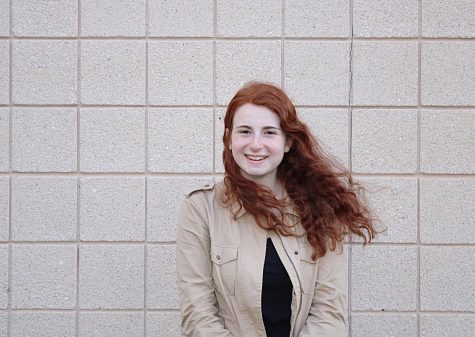
Jenna, an IB senior, is so excited for her fourth and final year at The Harriton Banner, this year as Executive Editor. Along with writing articles, Jenna...


